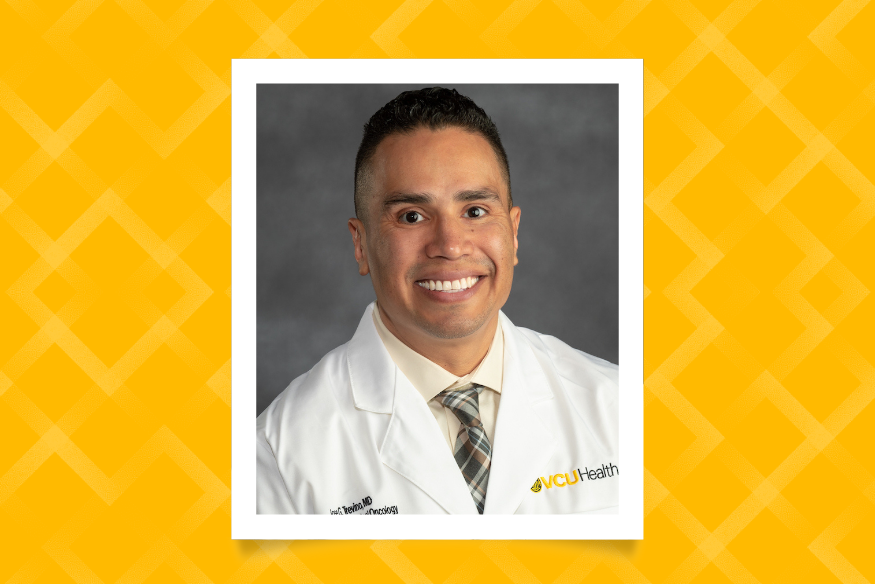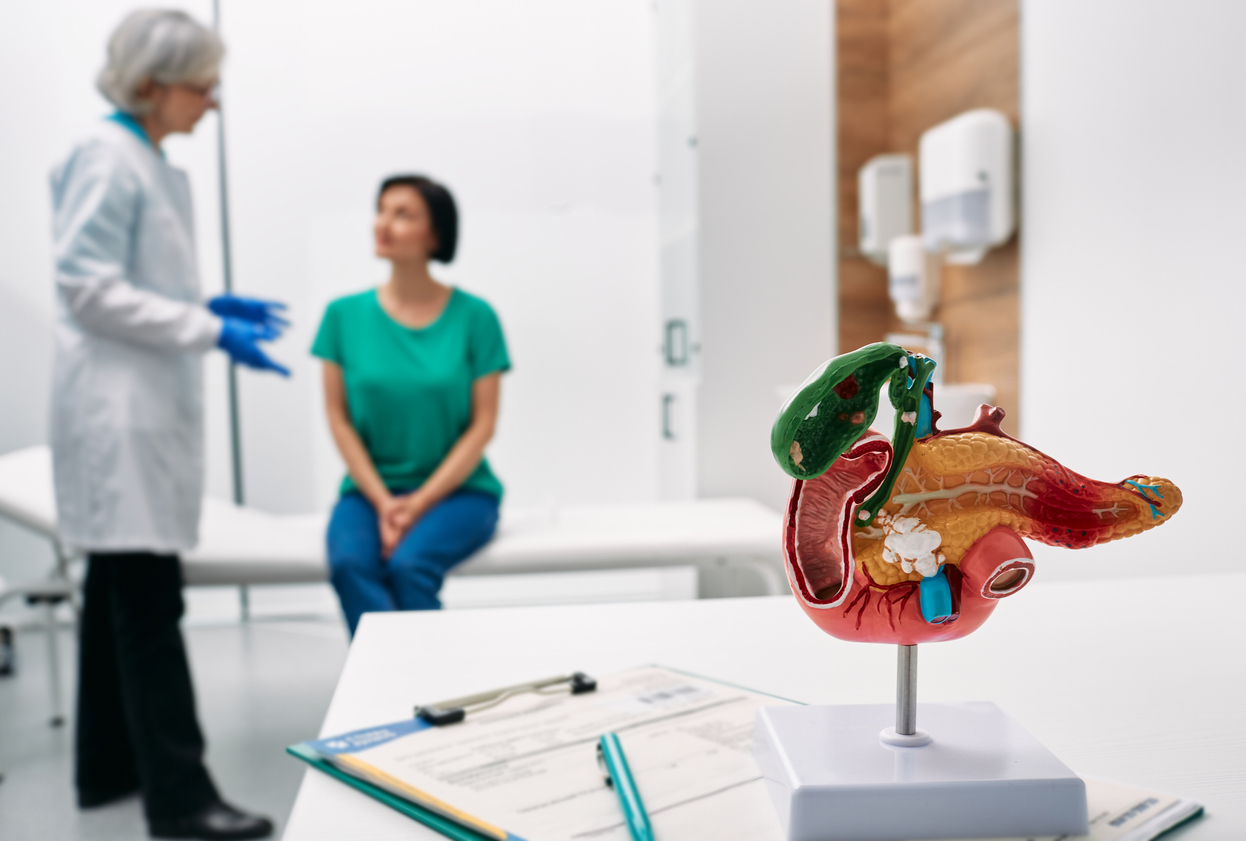Latest News
Clinical Care, Prevention
Pancreatic Cancer Awareness Month: Q&A with Dr. Jose Trevino
Nov 24, 2025

For Jose Trevino, M.D., FACS, the Geoffrey R. Shudtz Chair in Pancreatic Cancer Research and Surgeon-in-Chief at VCU Massey Comprehensive Cancer Center, his interest in pancreatic cancer was sparked at an early age, when he walked through a hospital with his father and saw a patient suffering from the disease.
That image stuck with Trevino, who would embark on a career researching pancreatic cancer prior to joining Massey in October 2020.
With November serving as Pancreatic Cancer Awareness Month, we sat down with Trevino to discuss the disease, available screening and treatment options, risk factors, and more.
What inspires you to do this work?
When I was younger, I would always tell people that I would take on the biggest challenges, because most people would tell me I couldn't do it. My interest in dedicating my life to pancreatic cancer started in 2003 because it is a disease that, unfortunately, is often caught late and has a really low survivability.
Pancreatic cancer is incredibly difficult to treat, as 80% of people present with metastatic disease, which means by the time we are able to diagnose a patient, the cancer has already spread in the body and there's no real chance for cure.
I've tried to be a person who always takes on some of the hardest obstacles, and when presented with the opportunity to begin doing research in 2003, that's exactly what I went after. I started doing pancreatic cancer research in the midst of my surgical residency, and then ultimately committed myself to being a clinician in pancreatic cancer as well.
You are Massey's lead oncology surgeon and a leader at our cancer service line. How is Massey innovating in general when it comes to cancer surgery?
When I joined VCU, the idea was that I would come here to build and recruit some of the best talent in the country. And Massey has made that happen.
We've been blessed as a division to have grown significantly over the past few years, and we continue to recruit leading surgical oncologists. We just hired another hepatopancreatic and biliary surgeon (HPB), Ricardo Bello, M.D., MPH, and two rising stars, Leopoldo Fernandez, M.D., and Adam Khader, M.D..
With all these additions and the development of our cancer service line, we continue to innovate and deliver some of the best cancer care in the country.
What is it that separates VCU Massey Comprehensive Cancer Center from other places?
Richmond, Virginia, has a patient population that is truly representative of the United States. We have a very diverse patient population. Knowing that I was doing health disparity research in pancreatic cancer, I couldn't have thought of a better place to be than a place that is a prime representation of who we are as a country.
I’m lucky to live and work in a community that is so diverse, so powerful, so rich, and everything we've done, on an academic level or a public service level, has been based around the people we serve and our community - that is our strength.
What are the challenges of treating pancreatic cancer?
 By 2030, it is estimated that pancreatic cancer will be the second leading cancer-related cause of death in the United States.
Pancreatic cancer is routinely caught at a stage where we can't do much more than give systemic chemotherapy.
By 2030, it is estimated that pancreatic cancer will be the second leading cancer-related cause of death in the United States.
Pancreatic cancer is routinely caught at a stage where we can't do much more than give systemic chemotherapy.
Pancreatic cancer will be the second leading cancer-related cause of death in the United States by the year 2030. Therefore, it's a big problem, and it will continue to be a big problem unless we do something or really act.
We know it's a bad disease and it's hard to treat, but we are learning more about this disease every day. I can say with sincerity, I wouldn't be doing this if I didn't believe there was a lot of hope that we could really push the survivability of this disease way beyond what it is today.
Are there people or groups that are at higher risk for pancreatic cancer?
We now have a high-risk pancreatic cancer clinic at Massey, run by myself and my partners through a clinical trial named PRECEDE, and it's allowing us to really organize our high-risk evaluation of patients.
Having a strong family history can make you more alert to the possibility of developing pancreatic cancer over time.
People who have certain mutations, such as PRSS1, or BRCA1, or BRCA2, ATM mutations and others are at a higher risk of developing pancreatic cancer.
Family history and these gene mutations are clearly warning signs for the potential development of not only pancreatic cancer, but other cancers as well.
Lastly, tobacco smoke is an enormous risk factor for the development of pancreatic cancer.
Are there any warning signs people should look for that may signal pancreatic cancer?
If you ever have really bad pain in the center of your abdomen that sometimes leads to your back, otherwise known as pancreatitis, that's always a warning sign.
If you happen to have a cyst in the pancreas, that is a big deal. Surveillance is incredibly important as these cysts can sometimes be the precursor to the development of cancer. The pancreas is changing, and you should be aware of it.
You could have an obstruction at the head of your pancreas, which could lead to the development of jaundice, yellowing of the skin and the eyes.
Additionally, your urine turns darker, and your stool turns pale. These are things that we tell our patients to keep an eye out for.
Losing a lot of weight unintentionally will always be a red flag for patients to look out for. Another warning sign is healthy individuals in their 60s who suddenly get diagnosed with diabetes.
I always tell people that if you develop pancreatitis or sudden diabetes, you should be aware that it's your pancreas becoming dysfunctional, and one of the things that can cause this is pancreatic cancer.
The other thing that people should look out for is what's called pancreatic enzyme insufficiency (PEI). That just means that one of the pancreas functions is also failing, the exocrine part, which allows us to digest our foods. And when the exocrine part of the pancreas starts to fail, you start to have really oily stools, because you're not able to digest or absorb certain fats.
Are there ways to reduce the risk of pancreatic cancer?
One of the biggest ones is either quitting or not starting smoking. But it’s important to try and exercise and be vigilant about your health. And by that, I mean not just eating healthy, but listening to your body and noticing changes. If you have pancreatitis or other pancreatic changes discussed above, don't ignore it.
Are there certain segments of the population that are more at risk for pancreatic cancer?
The African-American population has a higher level of not only getting pancreatic cancer, but also dying from it. There are certain races and ethnicities that are afflicted and have a higher mortality associated with pancreatic cancer than others.
Long-term, I think as our science gets better, we will start looking at other factors. Besides the simple risk factors of smoking and pancreatitis, exposure to certain chemicals can result in the development of pancreatic cancer as well.
We should start looking at other factors like stress, social determinants or social drivers of health, these other things that ultimately can shift our physiology toward a more acceptable state for the development of cancer. When we start to pay attention to that more, what we're going to realize is that there are certain patient populations that have a higher level of exposure to a lot of the risk factors I just talked about.
What are the treatment options for pancreatic cancer?
The way we treat pancreatic cancer has to be multidisciplinary, in that we have to bring together experts in a multitude of different fields to help us treat our patients. Our cancer service line brings medical oncology, radiation oncology, surgical oncology, nutritionists, mental health specialists - really the entire team together - creating powerful outcomes for our patients.
We treat an incredible population of patients. But Massey, and its Comprehensive Cancer Center designation from the National Cancer Institute (NCI), has allowed for us to come together as a group. It really provides the environment for us to be able to work together toward the betterment of these patients, and ultimately increase their survival.
What kind of research is Massey engaged in regarding pancreatic cancer? Is Massey conducting any clinical trials right now, centered around pancreatic cancer?
Chuck Harrell, Ph.D., and I were honored to receive a U54 grant, one of the bigger team science awards you can get from the NCI at the National Institutes of Health. And one of the goals of that is to figure out novel therapies in pancreatic cancer.
We’re harnessing a very personalized approach toward our pancreatic cancer care by taking tumors from the operating room, from our patients, and then treating those particular tumors from one patient with hundreds of different investigational new drugs to see which one would work best. That's just one patient. We're doing hundreds of these procedures every year in the hopes of developing novel therapies toward pancreatic cancer.
There are other great investigators at VCU, like Said Sebti, Ph.D., who is currently looking at KRAS inhibitors, since KRAS is the most mutated protein in pancreatic cancer.
We're always trying to bring more clinical trials to VCU and Massey. We currently have two underway which look at particular KRAS mutations, as well as second-line and third-line therapies for pancreatic cancer.
I'm currently interested in bringing a clinical trial to VCU that is going to look at a potential drug for the maintenance of muscle mass in pancreatic cancer patients.
I think we are ahead of a lot of different major academic centers and comprehensive cancer centers in the country because our multi-faceted approach, along with our patient population, is the most powerful aspect of VCU and Massey.
Written by: Bill Potter
Related News
Research & Innovation, Clinical Care, Community Engagement
Clinical trials: Shaping the standard of cancer care for the countryFeb 9, 2026

Get access to new, innovative care
Treatments in clinical trials may be more effective or have fewer side effects than the treatments that are currently available. With more than 200 studies for multiple types of cancers and cancer prevention, Massey supports a wide array of clinical trials.

Find a provider
Massey supports hundreds of top cancer specialists serving the needs of our patients. Massey’s medical team provides a wealth of expertise in cancer diagnosis, treatment, prevention and symptom management.
